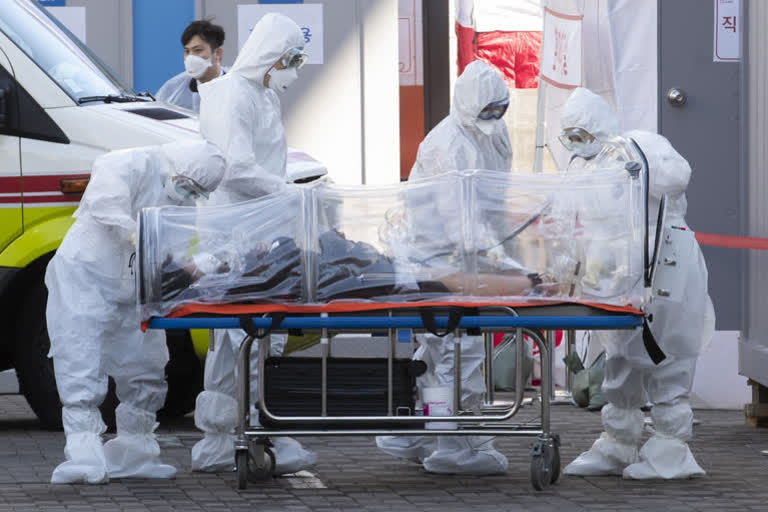Hyderabad: At a time when the Indian Council of Medical Research (ICMR) - the country’s nodal body for coronavirus testing - is claiming that India’s positivity rate so far as COVID-19 is concerned is around 4.5 percent with the disease’s curve being on the flattening path, former Additional Director General of ICMR Dr Sujit Kumar Bhattacharya said test-based data will present a clearer picture, while stressing on the need to boost testing.
In an exclusive interview to ETV Bharat’s Dipankar Bose, Dr Bhattacharya, who is an expert in the field of Immunology and Microbiology, and has also served as the former Director of National Institute of Cholera and Enteric Diseases (NICED), shared his opinion on the COVID-19 outbreak in the country and the world. He also discussed ways of how the country can deal better with the disease.
Here is the edited text of the interview:
Q) Researchers at Oxford University are working to develop a new vaccine for coronavirus. If proven effective, a safe coronavirus vaccine could provide an exit strategy for the pandemic. Researchers have already said they have the genome sequence of SARS-CoV-2 and are using DNA techniques to develop an antigen. Does it feel promising to you?
Yes, researchers at Oxford University are trying to develop a vaccine against COVID-19. They have already vaccinated two healthy persons and are waiting for the response. This is a phase-1 trial where safety and to a lesser extent, efficacy will be seen. A Large number of volunteers are ready for further trials. The Trial Coordinator or P.I. is optimistic that it will succeed (80%). Once successful, it is required to manufacture a large number of vaccines and to this, India is a partner. The vaccine will first be given to UK citizens and then to the rest of the world. We will have to wait or definite results.
Q) ICMR has said that the positivity rate for COVID-19 is around 4.5 per cent in India and that the curve is on the flattening path. Do you agree to this?
Yes. There is no reason for not to agree. However, we must remember the sample size and whether it is representative enough. That needs to be looked into for drawing any conclusion. We cannot have assumptive inferences.
Q) Do you feel more tests should have been done across the country, especially in the villages and since the testing penetration is not that deep, we are not getting the true picture?
Yes, that is right. Availability of testing kits, access to the population, maintaining social distance are factors that need to be considered. There is no doubt more tests are required and only tests and test-driven data will present a better idea.
Q) There are reports that Rapid antibody-based blood test kits from China are faulty in nature and ICMR has rejected several batches of these. With RT-PCR test results taking a long time to show results, do you think there is any way out from Rapid antibody kits in testing COVID-19 patients?
See, testing is the only recourse to tracing and containing the spread of this virus. It is not about finding a way out, it is more about trying to achieve a solution. Of course, the recent developments in IIT-Delhi on developing indigenous testing kits is a tremendous boost. We hope that very soon other testing kits, which are affordable too, will hit the markets soon. Intense research is going on in this field across the world and I feel results are just around the corner.
Q) What is your suggestion for ICMR and the government in their fight against the spread of Coronavirus?
ICMR is one of the driving engines in India's fight against Coronavirus. I do have a couple of suggestions for the ICMR at this critical time. First is, proper encouragement should be there to develop more specific tests. Continuous experiments and the development of an effective treatment protocol has to be formulated. We cannot go haywire. Regular consultation with experts outside ICMR should be held to get the widest possible views on the issue. I am sure research is on to develop an indigenous vaccine for this virus alongside other global efforts. ICMR should be pivoting the research and more funds should be allocated to continue those researches. Training to manage COVID-19 patients, as well as a treatment protocol, cannot be done by announcements. For a vast country like ours, we have to reach to most corners with adequate training modules, so that people, in general, get the benefit. From a researcher's point of view, I feel high-quality research and review papers in IJMR should be published for knowledge sharing. Finally, a COVID-19 task force should guide and encourage all COVID-19 related research.
Q) Both BCG trials and use of antimalarial drug Hydroxychloroquine have shown no decisive results in dealing with the spike in Coronavirus cases. According to you what could be the reasons?
BCG causes delayed hypersensitive reactions against specific antigens. I do not see any reason for it to be useful against COVID-19. Hydroxychloroquine has cardio-toxicity, QT-prolongation and dangerous arrhythmias. It is not effective according to recent studies. Alternative ways have to be found. Trials for an effective vaccine could be the ultimate answer.
Q) The lockdown period is only getting extended by the day. Once the lockdown is over, do you feel that only the elderly will remain the vulnerable group or there will be others?
Everybody is susceptible and even recurrent infection has been reported. However, considering the economic consequences, this lockdown should be lifted in a phased manner as proposed in Europe and other countries. Sudden withdrawal of lockdown will have dangerous consequences as we are dealing with a very large number of people.



